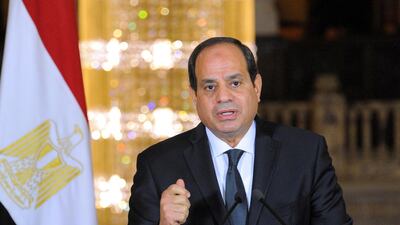Egyptian President Abdel Fattah El Sisi on Tuesday stressed that Qatar must meet the 13 demands tabled by four Arab nations to resolve the diplomatic crisis.
Saudi Arabia, the UAE and Bahrain severed relations with fellow GCC member Qatar in June 2017 because of Doha's interference in their internal affairs and its support for terrorist groups such as the Muslim Brotherhood. Egypt also joined the boycott.
"There are ongoing efforts that we hope will succeed,” Mr El Sisi said at the World Youth Forum in Sharm El Sheikh.
"Doha’s position has not changed and there are 13 conditions that have not been met.
Acting as a mediator, Kuwait presented Qatar with a list of demands from the four Arab nations in 2017.
They include closing broadcaster Al Jazeera, drastically scaling back co-operation with Iran, removing Turkish troops from Qatari soil, ending contact with groups such as the Muslim Brotherhood and submitting to monthly compliance checks.
The four Arab countries said compliance would "protect their national security from terrorism".
Qatar's Foreign Minister, Sheikh Mohammed bin Abdulrahman Al Thani, said talks with Saudi Arabia had broken the stalemate and that Doha would "study the demands".
But Sheikh Mohammed said Doha would not alter relations with Ankara to resolve the dispute.
After the GCC's 40th annual summit last week, the UAE's Minister of State for Foreign Affairs, Dr Anwar Gargash, said Gulf leaders agree that “long-term, genuine grievances” must be addressed to resolve the crisis.
There was some speculation before the summit that Sheikh Tamim, Emir of Qatar, would attend, possibly indicating a breakthrough in resolving the dispute.
But instead, Doha sent its Prime Minister, Sheikh Abdullah bin Nasser Al Thani.
“We are not there yet. That is the view from the Riyadh summit,” Dr Gargash said on Twitter.
In the past couple of years, Doha often sent lower-ranking officials to GCC meetings.
The new Saudi Foreign Minister, Prince Faisal bin Farhan, said Kuwaiti mediation would continue away from the media and public eye.
Officials in the Gulf and Egypt have long said that relations could be restored if Qatar took serious steps to address the concerns.
The White House said US President Donald Trump spoke with Sheikh Tamim on Monday and expressed hope that discussions “would lead to resolution of the Gulf dispute".


